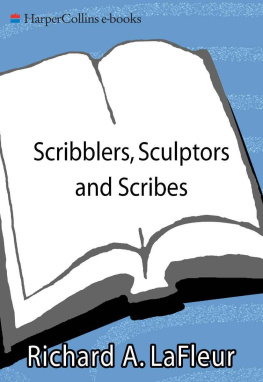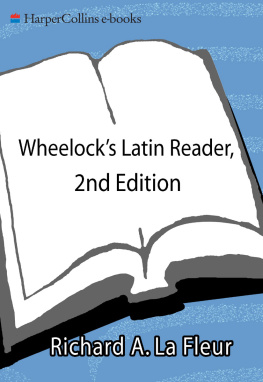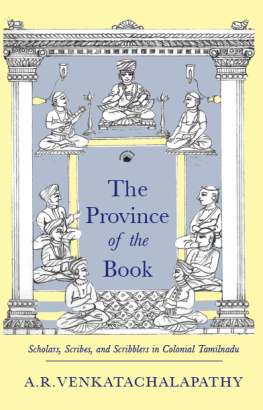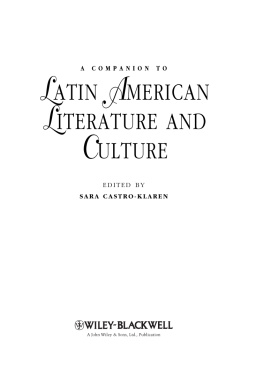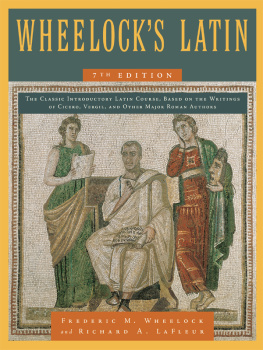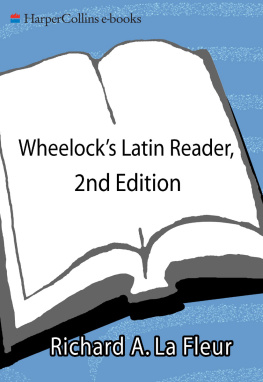LaFleur - Scribblers, Sculptors, and Scribes: a Companion to Wheelocks Latin and Other Introductory Textbooks
Here you can read online LaFleur - Scribblers, Sculptors, and Scribes: a Companion to Wheelocks Latin and Other Introductory Textbooks full text of the book (entire story) in english for free. Download pdf and epub, get meaning, cover and reviews about this ebook. City: New York, year: 2010, publisher: HarperCollins e-books, genre: Children. Description of the work, (preface) as well as reviews are available. Best literature library LitArk.com created for fans of good reading and offers a wide selection of genres:
Romance novel
Science fiction
Adventure
Detective
Science
History
Home and family
Prose
Art
Politics
Computer
Non-fiction
Religion
Business
Children
Humor
Choose a favorite category and find really read worthwhile books. Enjoy immersion in the world of imagination, feel the emotions of the characters or learn something new for yourself, make an fascinating discovery.
Scribblers, Sculptors, and Scribes: a Companion to Wheelocks Latin and Other Introductory Textbooks: summary, description and annotation
We offer to read an annotation, description, summary or preface (depends on what the author of the book "Scribblers, Sculptors, and Scribes: a Companion to Wheelocks Latin and Other Introductory Textbooks" wrote himself). If you haven't found the necessary information about the book — write in the comments, we will try to find it.
LaFleur: author's other books
Who wrote Scribblers, Sculptors, and Scribes: a Companion to Wheelocks Latin and Other Introductory Textbooks? Find out the surname, the name of the author of the book and a list of all author's works by series.
Scribblers, Sculptors, and Scribes: a Companion to Wheelocks Latin and Other Introductory Textbooks — read online for free the complete book (whole text) full work
Below is the text of the book, divided by pages. System saving the place of the last page read, allows you to conveniently read the book "Scribblers, Sculptors, and Scribes: a Companion to Wheelocks Latin and Other Introductory Textbooks" online for free, without having to search again every time where you left off. Put a bookmark, and you can go to the page where you finished reading at any time.
Font size:
Interval:
Bookmark:
A Companion to Wheelocks Latin and Other Introductory Textbooks

The ABCs of Latin, Love, and Living Well
Grave Goods, Gomora, and Sage Moral Guidance
Lovers, a Laureate, and the Labyrinth
The Glory of Profit, a Gladiator to Sigh for, and a Girl Youd Not Want to Kiss
Would-be Mayors, a Minor-Leaguer, and a Rebel without a Clue
Mad Dogs, Bad Politicians, and More Wisdom of the Ancients
All Hail to Sulla, Soothsayers, and the Sound of Mind and Body
Gladiators Who Win, Meditators Who Write, and Good Sons Who Read Good Books
A Princely Patron, a Seller of Dung, and Loiterers All Forewarned
Love and Loathing, Electioneering, and the Hostile Advance of Death
Looking for Love, Seizing the Day, and Wearing Your Hat in the Sun
Men Who Deceive, the Heedless Dead, and Doctors in Novel Positions
An Exemplary Patron, an Imperial Parrot, and Pompeian Guys and Gals Hanging Out
Doomed Mayors, Magic Squares, and a Truly Fishy Menu
Princes of Youth, Pricing a Bride, and Pompeiis Got Talent!
Mushrooming Concerns, the Joys of Madness, and the Sweetheart Monarch of Pompeii
A Lost Meal, a Lost Love, and a Lost Revolution
Winners and Losers, Rooms to Let, and Lads Who Risk Losing Their Butts
A Beast Hunt, Blind Lovers, and In the Beginning
A Shared Bowl, Swords into Scythes, and Ill Scratch Your Back, You Scratch Mine
Friends for Life, the Ideal Wife, and Taking Your Feast to the Grave
On Conquest, and Candles, and Keeping the Faith
Politics, Prophecies, and Broken Promises
Women in Love, Writing the Laws, and a Pertussive Toothless Wonder
Fifty Oysters, Eight Ways to Punish, and Burying Your Seven Men
Sour Grapes, the Gift of Death, and Smart Ways of Looking Good
On the Gods, Blind Love, and French Toast
Curses, Comestibles, and a Birthday Surprise
Gladiators, Clothes Cleaners, and the Gospel of John
Campaigning, Counting Kisses, and a Cool Miss Named Snow White
Bathing, and Baking, and Keeping the Peace
Petty Thieves, a Plagiarist, and the Punic Avenger
Kitchen Tricks, a Sober King, and Carrying Coals to Newcastle
Constantines Arch, a Haunted House, and Hanging in Pompeii
Fatality, the Fates, and a Fathers Grief
Romance, Rivalries, and Creating the World
Oracles, Oral Hygiene, and the Ides of March
Aborigines, Busybodies, and Brits
A Time for Peace, a Time for Love, and a Time to Harvest the Day
The Imperative to Love, Some of Lifes Celebrations, and the Augustan Legacy to Rome
ALICIAE AMATISSIMAE AC LIBERIS NEPOTIBVSQVE CARISSIMIS

View through the forum at Pompeii, looking north toward Vesuvius
A few years back, when I had just completed my last book and found myself perilously at leisure (think of the Roman poet Catullus, who once admonished himself that leisure is your problem, otium molestum est ), I conceived the idea for this new undertaking. Though the implementation proved to be, if not molestum, then for sure NEGotium, the premise itself was uncomplicated. I wanted to gather and edit a collection of entirely authentic, unadapted, unsimplified classical Latin texts that beginning students, from the very first day of their introduction to what I ever reverently dub The Mother Tongue, could read, enjoy, and profit from and that would provide a wide range of insights into not just the minds of Romes movers and shakersher politicians and generals, philosophers and great poetsbut also into the daily lives of the Average Joe and Jane Roman.
For years I have taught from (and become otherwise engaged with) that venerable classic, Wheelocks Latin, whose cardinal virtue is that it introduces students to ancient authors from the very outset, through individual sententiae and then gradually longer and more complex prose and verse texts. As early as Wheelocks second chapter there are sententiae antiquae extracted verbatim from such writers as Terence, Cicero, Propertius, Livy, Phaedrus, Seneca, Juvenal, Pliny, Publilius Syrus, Servius, and St. Jerome. Chapter five introduces the first complete, unadapted text, an epigram by the humorist Martial, many of whose lively little poems are sprinkled throughout the books forty chapters, which include other unsimplified, unaltered texts, mostly excerpts, from authors like Caesar, Catullus, Vergil, Horace, Ovid, Seneca, and Petronius. The sampling from classics of Roman literature found in Wheelocks Latin makes it unique among introductory Latin textbooks, and, along with its clear and orderly presentation of Latin grammar, has helped retain its place as one of the most widely used introductory texts for beginning students.
Nevertheless the volume of readings is necessarily restricted, and very many of the selections are adapted, which is to say altered and simplified in one way or another, so that students who have learned only a limited amount of grammar at a given point in the text can still read passages that would otherwise be too complex. Other beginning textbooks have similar, in most cases considerably greater, limitations in their introduction of entirely authentic texts. Virtually every beginning Latin book could benefit from a companion text that gets students reading real and interesting Latin statim, immediately!
SCRIBBLERS, SCVLPTORS, AND SCRIBES
Firstthe Scribblers
The challenge in producing such a companion reader was to identify authentic texts that were not only of sufficient interest, but also simple enough in terms of grammar and vocabulary to be read by students in the earliest stages of learning the language. The solution I came upon (and with some joyfully helpful advice from my uxor carissima, Alice!) is to be seen in the title, Scribblers, Scvlptors, and Scribes. The Scribblers youll encounter beginning in the first of the books forty chapters are those everyday Romans who had, as seems clear, an overwhelming passion for writing on wallsand doors, and storefronts, and columns, AND any and all available surfacesabout love and hate, friends and enemies, life and death, politicians and gladiators, and just about every other subject imaginable. They have left literally thousands of graffiti that afford us countless, sometimes intimate insights into their daily thoughts and activities. The book contains dozens of such graffiti, the vast majority of them from Pompeii, whose destruction in the cataclysmic eruption of Mount Vesuvius, in August, A.D. 79, at once captured and preserved for us the single largest corpus of wall-writings that survive from the ancient worldmany of them dating to the years and months immediately preceding the catastrophe.
Even more so than twenty-first-century Americans, the Pompeians scribbled everywhere, typically scratching their messages into plaster walls with a stilus or any sharp instrument that might be at hand; sometimes the texts were painted (and in that case called dipinti ), often in bright colors, especially in the case of the political campaign notices ( programmata ) and advertisements for gladiatorial games that were so common all around the city. Besides the insights these texts provide into aspects of daily life in a provincial town of the first century A.D.., they can teach us something too about Roman literacy; some studies have suggested a literacy rate of about twenty percent during the early Roman empire, but in a bustling, mercantile town like Pompeii, the level might have been much higher. We can be grateful, it might be added, that not all writers of graffiti were quite masters of the Latin language, as you will see from the selections in this book: just as in the case of modern graffiti youve seen in the bathroom down the hall, these ancient wall-writings often contain spelling errors, which at times provide important clues to how Romans pronounced their language, as well as grammatical mistakes, which can provide consolation to modern Latin students who sometimes repeat them!
Font size:
Interval:
Bookmark:
Similar books «Scribblers, Sculptors, and Scribes: a Companion to Wheelocks Latin and Other Introductory Textbooks»
Look at similar books to Scribblers, Sculptors, and Scribes: a Companion to Wheelocks Latin and Other Introductory Textbooks. We have selected literature similar in name and meaning in the hope of providing readers with more options to find new, interesting, not yet read works.
Discussion, reviews of the book Scribblers, Sculptors, and Scribes: a Companion to Wheelocks Latin and Other Introductory Textbooks and just readers' own opinions. Leave your comments, write what you think about the work, its meaning or the main characters. Specify what exactly you liked and what you didn't like, and why you think so.

